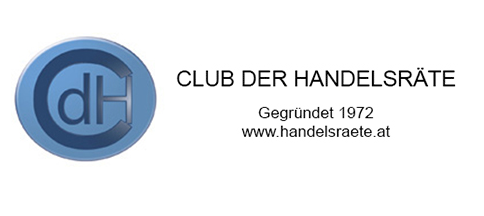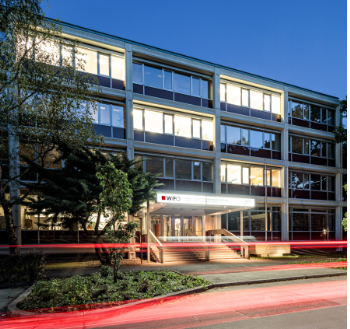Live Presentation at Austrian Institute of Economic Research (WIFO)
Due to the ongoing Covid-19 restrictions our first live-event took place in April 2022 in the premises of WIFO, Austrian Institute of Economic Research, where Director Univ.-Prof. MMag. Gabriel Felbermayr PhD gave us a lecture about "War in Europe - What can sanctions achieve in our days".
Some basic information about the Austrian Institute of Economic Research (WIFO): Its mission is overcoming socio-economic challenges and supporting evidence-based decision-making by building bridges between theory, empirical facts and policies.
WIFO, founded in 1927 by Friedrich August von Hayek and Ludwig von Mises for the purpose of business cycle analysis, is today the leading institute for applied empirical economic research in Austria with a strong commitment at a European level. The institute is non-profit and independent of politics and business in its scientific activities. WIFO's mission is to build a bridge between basic academic research and policy in order to contribute to tackling socio-economic challenges and to create sound foundations for decisions in business and society which require economic information. At the core of WIFO's bridging function are empirical analyses prepared with scientific diligence and integrity. WIFO's bridging function also involves a mediating role between economic policy institutions, universities and consulting firms. WIFO is the point of contact for international organisations (EU, OECD and IMF) and rating agencies regarding national economic development and the assessment of economic policy measures.
The range of services includes:
- analysis and forecast of economic, social and ecological trends,
- scientific research and analyses on relevant topics,
- quality-assured economic data,
- simulation and evaluation of the effects of economic policy measures,
- evidence-based economic policy advice at national and international level,
- impartial information for economic policy, public and international organisations,
- design and implementation of (business) surveys.
WIFO's research is based on a broad theoretical economic foundation and on state-of-the-art empirical methods. The five research areas, which are structured according to economic disciplines (macroeconomics, labour and social affairs, industrial, regional and environmental economics) and which are the cornerstones of WIFO's organisation underpin its bridging function. WIFO maintains and develops detailed models for the analysis of micro-, macro-, regional and environmental economic issues as well as sophisticated econometric know-how. In combination with its comprehensive coverage of economic disciplines, WIFO is able to identify synergies and trade-offs of economic policy measures on an economic, social and ecological level.
Extensive experience in handling and visualising complex data as well as detailed knowledge of the institutional foundations of national and European economic policy ensure a high quality of research. WIFO also cooperates with universities and research institutions abroad and is advised by an international scientific advisory board. It cooperates closely with the Economic and Social Science Computing Center (WSR) to ensure an efficient IT and data infrastructure.
Univ-Prof. Dr. Felbermayr had changed the original topic from “Supply Chains
Redesign – Threats & Opportunities” to the "effects of sanctions"
due to the military raid of Russia against Ukraine. He pointed out that the EU
and its allies imposed the hardest sanctions. That implied the trade policy was
about to be reoriented, the industrial structures will change. There might be
more near shore investment. Trade was normally a good insurance against war but
it does not always work that way. There are pros and cons concerning
international division of labour. He quoted Adam Smith as saying:
"Limitation of trade can be necessary. In facht, the act of navigation
(banning Dutch ships at the time) is, perhaps, the wisest of all the commercial
regulations of England". An important point is national security.
Diversification especially in energy supply is now more and more necessary.
WTO/GATT rules were now at danger. The mechanisms are not safe any more. He
brought some examples. The US-China trade war would create a higher damage on
the Chinese side. He then quoted the old wording: If you want peace prepare for
the worst. Within the WTO/GATT rules there were no sanctions, only when dumping
occured. Disputes could be settled within the framework. Sanctions were only
threatened before but not imposed. The war changed it all. Political
consequences were another story now. Univ.-Prof. Felbermayr pointed out that
sanctions must be well prepared. That was also a question of dependency. The
adversary must be hit stronger than the one imposing sanctions. A new
dominating field were financial sanctions in addition to trade sanctions.
Furthermore he pointed out that the economy has to be prepared for a sanctions
policy, which he saw missing in Europe. In line with other economists
Felbermayr mentioned that import tariffs on Russia for crude oil may be more
effectful and create additional tax income for the states. Tariffs generate
revenue, sanctions not. However he also stated that there was an asymmetry,
because the Russian economy is small. It gets more affected and Chinese
companies are cautious as they don`t want to loose international markets. Gas
prices should not be subsidized by western governements. It was better to switch
to renewables as fast as possible. Companies must be forced to diversify. Not
all can be compensated.
Univ.-Prof. MMag. Gabriel Felbermayr
Director of the Austrian Institute of Economic Research (WIFO) in Vienna and university professor at the Vienna University of Economics and Business (WU) since 1 October 2021. He was born in June 1976 in Steyr, Austria. After studying Economics and Trade at the University of Linz, he went to Florence, Italy, to pursue his doctoral studies. From 2004 to 2005, he was an Associate Consultant with McKinsey & Co. in Vienna.
From 2005 to 2008, he was Assistant Professor at the University of Tübingen.
From 2009 to 2010, he held a chair in International Economics at the University
of Hohenheim (Stuttgart). From 2010 to 2019, he led the ifo Center for
International Economics at the University of Munich, where he also served asa
full professor in International Economics. From 2019 till September 2021 he was
President of the Kiel Institute for the World Economy and held a chair in Economics and Economic
Policy at Kiel University (CAU). Gabriel Felbermayr holds various roles and positions. His research and
consulting work focuses on issues of international trade theory and policy,
labour market research, European economic integration, and current economic
policy issues.
He has published a large number of articles in international academic journals,
policy briefs, and newspapers. His research has been recognised with several
awards.



